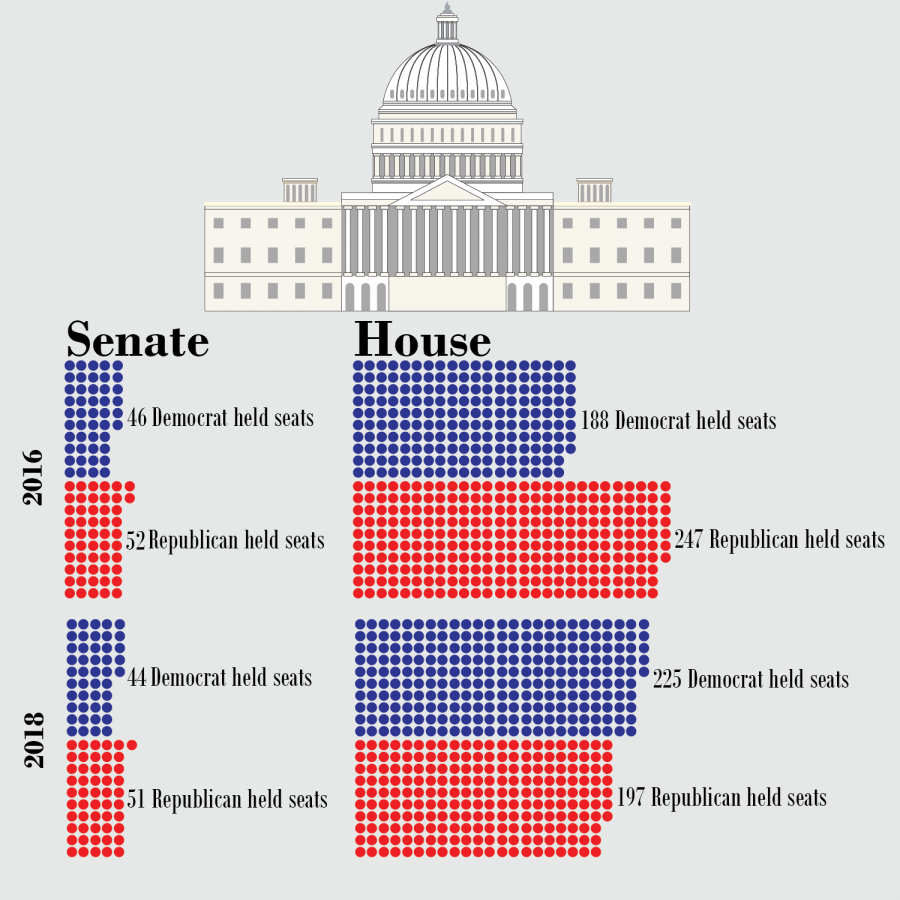Democratic ‘Blue Wave’ falls short
Nov 16, 2018
If the 2018 midterms were a referendum on the Trump administration, policies and actions, then the democratic “Blue Wave” failed. While voter turnout increased by nearly 40 percent from last midterm election, democrats did not get the results they wanted. In recap of the Kavanaugh hearing fiasco, nearly all the Senate democrats up for reelection who voted against Kavanaugh’s appointment were voted out of office and replaced by republicans.
Since the Civil War, when a new party has been voted into the presidency, like Trump and the republicans in 2016, only twice did the party in power not lose seats in the House. The average rate of attrition for the party would normally be 35 seats. With republicans having 43 seats vulnerable without an incumbent candidate, the democrats only took 27.
Championing identity politics, weak immigration policy and impeachment of President Trump, democrats have failed to hit on the issues which matter to voters. As former President Clinton best put it, “It’s the economy, stupid.” The job and economic growth of the Obama administration was anemic, averaging 2.1 percent annual GDP growth, the lowest since 1949. Meanwhile, under President Trump, unemployment is the lowest since 1969 with 3.9 million more employed since 2016. Wage growth is a 4.1 percent for Trump versus 3 percent for Obama. In Q2 for 2018, the U.S. saw 6.7 million job openings with 6.6 million unemployed. Despite the controversy and noise surrounding the administration, the economy is booming, not a good omen for democratic candidates going into the election.
These new faces of the Democratic Party include Alexandria Ocasio-Cortez, Beto O’Rourke and Andrew Gillum. Let’s take a look at these candidates in the aftermath of the election.
Alexandria Ocasio-Cortez is a 29-year-old ex-bartender whose platform included giving away citizenship to illegal immigrants, abolishing the Immigration and Customs Enforcement agency and economy illiteracy in the form of forgiving all student loan debt in the United States, a 15-dollar federal minimum wage and promises of federal housing and jobs for all. She has also likened engaging in academic debate to “catcalling” while getting support from Bernie Sanders and Elizabeth Warren, two of the most left-leaning members of the party.
Get The Daily Illini in your inbox!
Andrew Gillum, the democratic candidate for governor of Florida, was the subject of two separate FBI investigations, both involving corruption and lobbyist bribery. As commissioner of Tallahassee, he voted to increase his own pension while still in office. Gillum’s platform also includes the abolishment of ICE, a 150 percent increase of Florida’s corporate tax rate, opposes the state’s stand-your-ground law and seeks to restore voting rights to convicted felons. His close loss signals potential inroads to Florida come 2020 for democrats.
Beto O’Rourke is the democratic candidate for senator in Texas. Of the 38 million dollars raised by O’Rourke, 13.3 million was raised out of state. The Democratic Party’s commitment to spending in a governor’s race in Texas, a deeply red state, raises some questions about party’s leadership and their efficiency of campaign spending, with Nate Silver and 538 giving O’Rourke a lowly 21 percent chance of winning the election. His platform included significant gun control, weak border control, pro-illegal immigration and significant increases to emissions regulations. These are head-scratching positions to take in Texas — the state with the most guns per capita, an economic reliance on the petrochemical industry and a large influx of illegal immigrants. With Beto’s loss, possible calls have come for him to run for the presidency come 2020, but still, Beto’s failure to beat a wildly unpopular candidate in Ted Cruz signal he may not be the man for the job to run against the incumbent President Trump.
With these candidates, the Democratic Party is swinging to the far-left, actively bringing up socialists and democratic socialists into party leadership. This eschews attempts to broaden their base while catering to a vocal and extremist minority. The midterms showed that the democrats have not learned their lessons from 2016, when working-class voters flocked to republicans in droves, flipping Wisconsin, Pennsylvania and Michigan. With Trump poised to ride out his first term with a friendly Senate and small disadvantage in the House, democrats have to do better in order to have a chance in 2020. Change your message or change your candidates. Democrats, the clock is ticking.
Ajay is a junior in Engineering.






